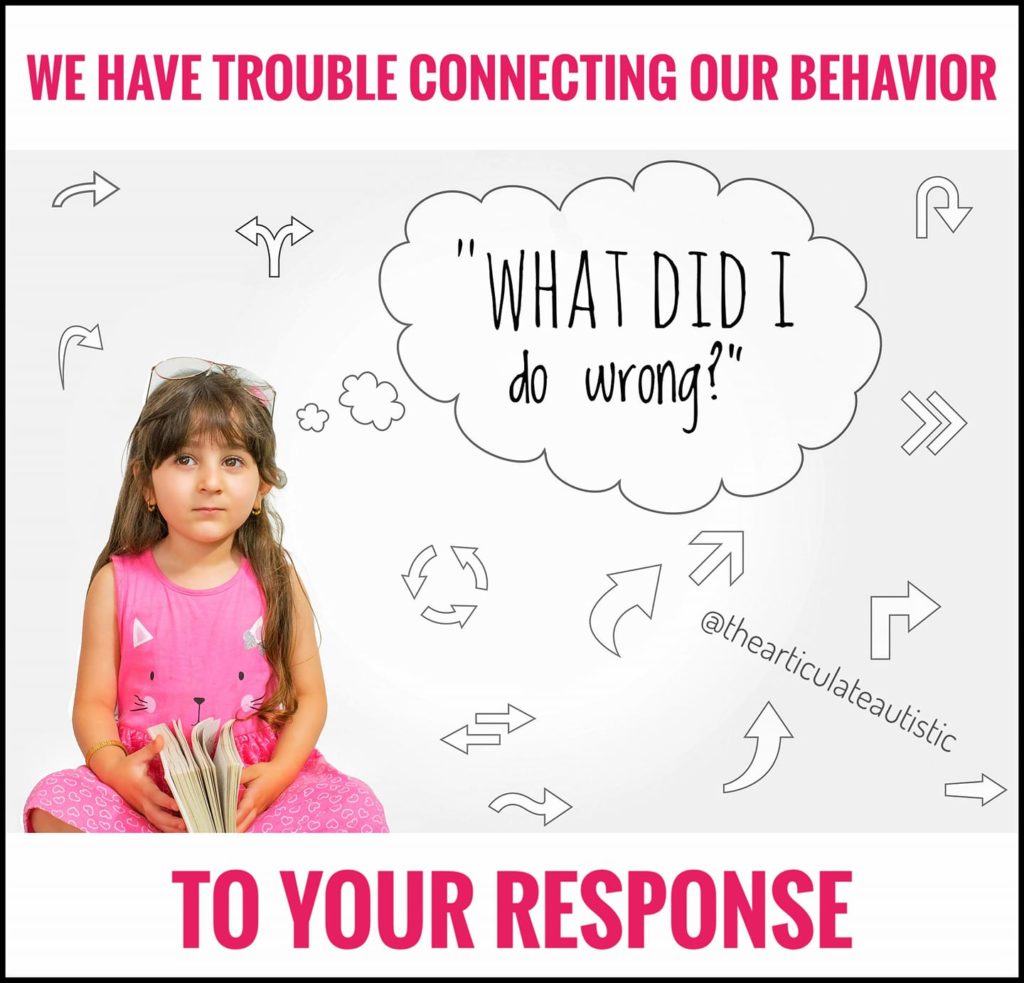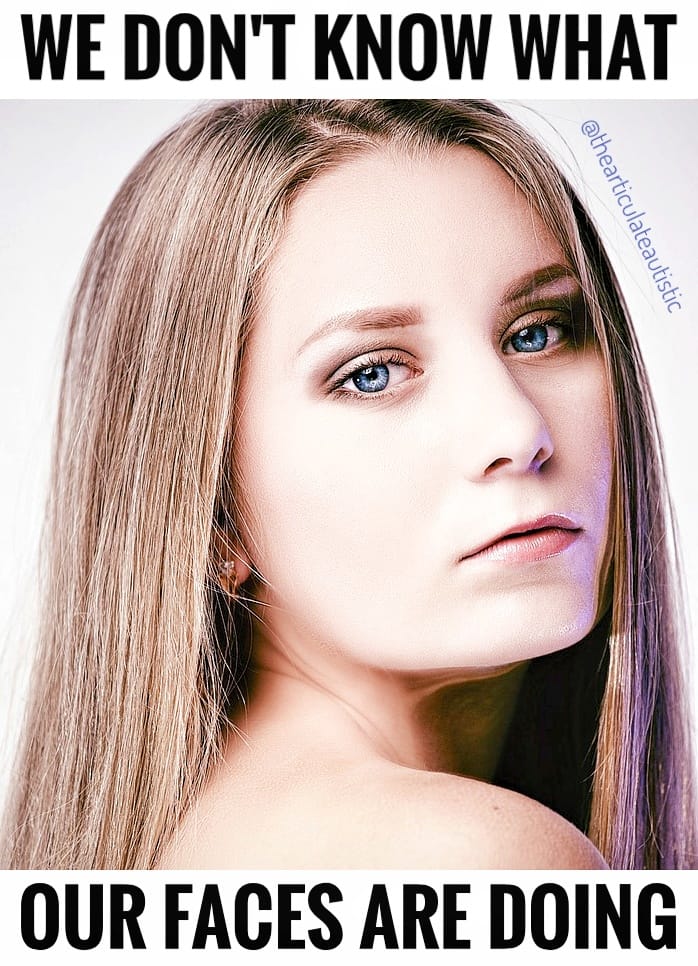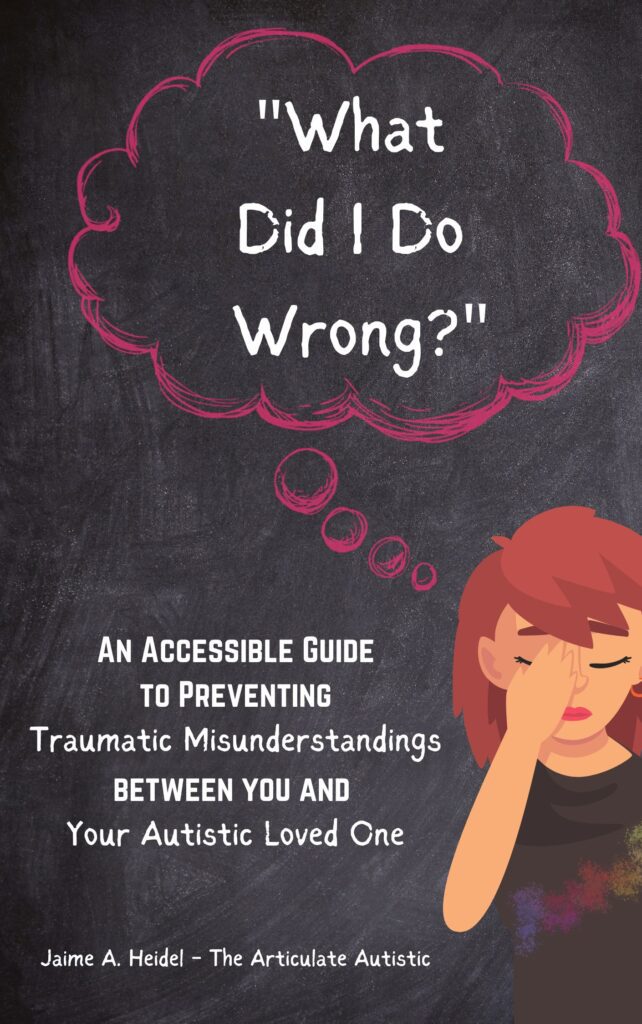We Have Trouble Connecting Our Behavior to Your Response

This post is a bit of a companion piece to the ones I’ve done about facial expressions, but it takes the conversation a bit deeper.
I’d like to explain this one by using a fictitious situation:
A little autistic girl is quietly reading a book in the living room during a birthday party for her father.
A guest walks past the living room to go to the bathroom and sees her reading.
“Mandy?”
Mandy keeps reading.
“Mandy?”
Mandy keeps reading.
The woman, getting angry, approaches the little girl and stands over her.
“Mandy!”
The little girl screams, throws the book up in the air and covers her ears, staring up the woman (who is a virtual stranger to her) in wide-eyed terror.
The woman, annoyed, sighs and tells the little girl to stop being so dramatic and get out to the party because it’s rude to be inside ignoring everyone.
Mandy tries to speak, but she can’t. Panic is coursing through her tiny frame, and she can’t make any sense of what the woman is saying. All Mandy knows is a stranger suddenly appeared over her and started yelling, and she wants to get away.
The woman, oblivious to the child’s distress, continues berating her, and even getting closer, getting in her face because Mandy won’t answer or acknowledge her.
Mandy’s facial expression changes to one of anger even though she’s really scared. She jumps up, pushes the woman out of her way and goes careening into the dining room, knocking over a vase, not hearing or noticing this at all, and finally gets to the back porch where she jumps into the safety of her mother’s arms.
The mother asks what happened, finds out what the woman did, kicks her out of the party, and never speaks to her again.
(I wanted that story to have a satisfying ending.)
As horrible as that scenario was, it could have been 10 times worse. Mandy could have been berated for knocking over the vase, being screamed at by multiple people and having absolutely no idea what was going on.
Incidents like this happened to me CONSTANTLY as a child. I would be minding my own business quietly and an adult would seem to “appear” out of nowhere and start questioning me or yelling at me. It was traumatizing!
From what I can piece together as an adult, there was something I was doing or not doing, saying or not saying that was “off” to people.
They would confront me about it, thinking I knew full well what was going on, and my reaction of fear and confusion would make them misunderstand me even more, and it would escalate from there until I was hysterically sobbing and hyperventilating, and people were just staring at me warily wondering what was going on.
I was exhausted, terrified, confused, angry, and would promptly disassociate the event having learned absolutely nothing only for the process to happen all over again hours, days, or weeks later.
I think children on the spectrum are especially vulnerable to this “cycle of misunderstanding”, but it happens to adults, too.
Since autistic traits are often given neurotypical motivation (lack of facial expression = angry, finding a quiet place = rude, knocking something over = purposeful, etc.), the people exhibiting these traits are treated as though these are their intentions when they are not.
Since the NT people mistakenly believe that they are “on the same page” with the autistic person, they will leave out critical information they think the autistic person already has and skip ahead in the story, so to speak, and start in the middle with anger and blame.
Since ND people have different motivations (lack of facial expression = not masking, finding a quiet place = recharging from social exhaustion or sensory overload, knocking something over = poor proprioception), they will not understand the NT reaction to their behavior.
The connection is not made. NT people aren’t “teaching us a lesson”, they are just terrorizing us!
Reduce traumatic misunderstandings between you and your autistic loved one by picking up a copy of my book, “What Did I Do Wrong?” today.





I’m an NT, and honestly, if I had been Mandy’s mother I would have been furious at whomever the adult was. Unless what the child is doing is aggressive or very dangerous (this requiring immediate intervention), to take it upon yourself to discipline other people’s children is considered rude and presumptuous. The socially correct way for that adult to handle her concerns would have been to approach Mandy’s mother, mention what the child is doing, and let the mother handle it (or not, if Mandy’s mother doesn’t think it’s a problem). There are some exceptions to that norm (teachers in schools, for example), but a birthday party in a private residential setting is not one of them.